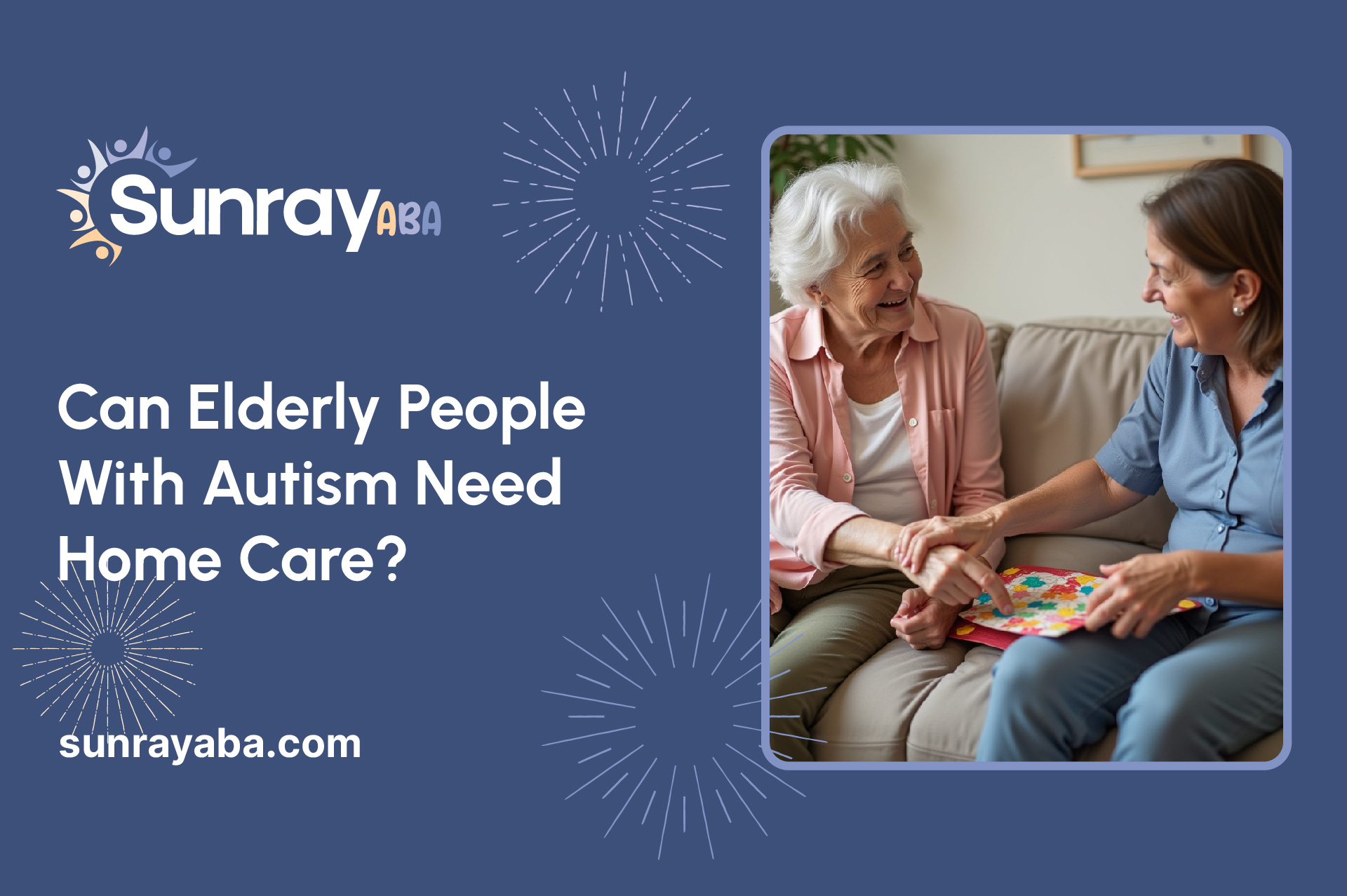Can Elderly People With Autism Need Home Care?

Understanding Seniors with Autism Spectrum Disorder
As the first generation diagnosed with autism spectrum disorder (ASD) reaches their golden years, families face unprecedented questions about appropriate care options. The intersection of autism and aging presents unique challenges that often necessitate specialized home care solutions tailored specifically to neurodivergent seniors.
While autism support has historically focused on children and young adults, the reality is that autism is a lifelong condition with evolving needs across the lifespan. This comprehensive guide examines whether elderly individuals with autism require home care services, what those services might look like, and how to access appropriate support.

The Growing Senior Autism Population: Understanding the Statistics
Recent research reveals a significant and growing population of older adults on the autism spectrum:
- 1.2% of adults over 65 are estimated to have diagnosed or undiagnosed autism spectrum disorder
- The number of adults with autism aged 65+ is expected to triple by 2030
- 67% of autistic seniors require some form of daily living assistance
- Only 23% of elderly people with autism currently receive autism-specific support services
- The average life expectancy gap between autistic and neurotypical individuals has narrowed to just 5-7 years
Understanding these numbers helps contextualize why specialized home care services are increasingly important for this growing demographic.

How Autism Manifests in Elderly Individuals
Autism in seniors often presents differently than in younger populations, with distinct aging-related considerations:
Age-Related Changes in Autism Symptoms
- Sensory sensitivities often increase with age (affecting 83% of elderly autistic adults)
- Communication challenges may become more pronounced, especially with hearing or vision loss
- Executive functioning difficulties can compound with typical age-related cognitive changes
- Anxiety and depression rates are higher (62% compared to 44% in neurotypical seniors)
Co-occurring Health Conditions
Elderly people with autism frequently experience multiple health conditions that complicate care needs:
- Gastrointestinal disorders (affecting approximately 70% of older adults with ASD)
- Epilepsy (present in 20-30% of autistic seniors)
- Sleep disorders (reported by 83% of families caring for elderly autistic individuals)
- Cardiovascular issues (1.5-2x more common than in neurotypical seniors)
- Medication sensitivities (reported in 56% of cases)
Unique Strengths and Preferences
It's equally important to recognize the unique strengths many elderly individuals with autism possess:
- Strong adherence to routines
- Detailed knowledge in special interest areas
- Precise observation skills
- Loyalty and dependability
- Problem-solving abilities within structured environments

7 Signs an Elderly Person with Autism May Need Home Care
Families often struggle to determine when home care becomes necessary. Look for these indicators:
1. Declining Self-Care Abilities
- Difficulty maintaining personal hygiene
- Inconsistent medication management
- Nutritional challenges or weight changes
- Home environment becoming cluttered or unsafe
2. Increasing Safety Concerns
- Wandering behaviors (affects 40% of elderly adults with autism)
- Difficulty recognizing dangerous situations
- Challenges with emergency response
- Vulnerability to financial exploitation
3. Health Management Complexities
- Multiple chronic conditions requiring coordination
- Missed medical appointments
- Difficulty communicating symptoms to healthcare providers
- Medication management errors
4. Caregiver Burnout
- Primary family caregivers experiencing health issues
- Signs of emotional exhaustion or compassion fatigue
- Reduced ability to meet complex needs
- Financial strain from caregiving responsibilities
5. Social Isolation
- Loss of structured community activities
- Reduced access to transportation
- Limited peer connections
- Withdrawal from previously enjoyed activities
6. Mental Health Changes
- Increased anxiety, depression, or compulsive behaviors
- Sleep disturbances beyond baseline patterns
- Emotional regulation difficulties
- Regression in coping strategies
7. Transition Challenges
- Loss of longtime residence or routine
- Death of parents or primary caregivers
- Retirement from long-term employment
- Health events requiring new adaptations
Types of Home Care Services Beneficial for Autistic Seniors
Home care for elderly individuals with autism can take many forms, depending on individual needs and preferences:
Personal Care Assistance
Services typically include:
- Bathing and personal hygiene support
- Medication reminders and administration
- Meal preparation accommodating sensory sensitivities
- Mobility assistance and fall prevention
Benefits:
- Maintains dignity while ensuring basic needs are met
- Can be tailored to individual communication preferences
- Preserves familiar routines and environments
- Provides consistent support from trained caregivers
Specialized Autism Home Health Services
Key components:
- Caregivers with autism-specific training
- Sensory-informed care approaches
- Communication adaptations
- Behavior support strategies
Implementation statistics:
- Specialized autism training reduces caregiver turnover by 47%
- Behavior incidents decrease by approximately 62% with properly trained staff
- Quality of life measures improve by 38% with autism-specific support
Home Environment Modifications
Common adaptations:
- Sensory-friendly lighting and noise reduction
- Visual supports and communication aids
- Safety features (door alarms, bathroom modifications)
- Organizational systems for daily living
Impact:
- Environmental modifications reduce anxiety by an average of 53%
- Falls decrease by 40% with appropriate safety adaptations
- Independence in daily tasks increases by 35%
Technology-Enhanced Support
Innovative solutions:
- Medication management systems
- Remote monitoring with respect for privacy
- Virtual support check-ins
- Sensory regulation technologies
Effectiveness:
- 73% of autistic seniors successfully adapt to supportive technology
- Emergency department visits decrease by 28% with remote monitoring
- Medication adherence improves by 46% with appropriate technology
Funding and Accessing Home Care for Elderly People with Autism
Understanding available funding sources is crucial for implementing appropriate home care:
Medicare Coverage
- Covers limited home health services for medical necessity
- Typically time-limited rather than ongoing
- Requires physician certification of need
- Does not cover custodial care or 24-hour support
Medicaid Home and Community-Based Services
- Waiver programs available in most states
- Can cover personal care, home modifications, and specialized support
- Income and asset restrictions apply
- Often has waiting lists (averaging 4-7 years)
Veterans Benefits
- Aid and Attendance benefit for eligible veterans
- VA-directed home care programs
- Caregiver support programs
- Home modification grants
Long-Term Care Insurance
- Must be purchased before significant care needs develop
- Varies widely in coverage for autism-specific needs
- Average annual premium: $2,500-$3,500
- Specialized policies may be required
Private Pay Options
- Family-funded care
- Special needs trusts
- ABLE accounts
- Reverse mortgages or home equity options
Creating an Effective Home Care Plan for an Autistic Senior
Implementing successful home care requires thoughtful planning:
Assessment Considerations
Key areas to evaluate:
- Sensory preferences and sensitivities
- Communication style and needs
- Daily routine preferences
- Special interests and motivations
- Specific triggers for distress
Professional involvement:
- Occupational therapy assessment
- Speech-language evaluation
- Functional behavior assessment
- Neuropsychological testing when appropriate
Caregiver Selection and Training
Essential qualifications:
- Understanding of autism in older adults
- Patience and flexibility
- Communication style matching
- Respect for autonomy and preferences
- Willingness to learn individual needs
Training components:
- Autism-specific communication strategies
- Sensory processing considerations
- Supporting routines and transitions
- Recognizing atypical pain presentation
- De-escalation techniques
Monitoring and Adaptation
Ongoing evaluation:
- Regular team meetings including the individual when possible
- Tracking of quality-of-life indicators
- Adjustment of support as needs change
- Proactive planning for health transitions
Conclusion: Supporting Dignity and Quality of Life
Home care can be essential for many elderly individuals with autism, providing the right balance of independence and support. With thoughtful implementation of specialized services, seniors on the autism spectrum can:
- Age in familiar environments
- Maintain important routines and interests
- Receive support tailored to their unique neurological profile
- Experience improved quality of life and reduced distress
As awareness grows about the specific needs of elderly people with autism, more specialized services and funding options are emerging. Early planning, creativity in support design, and collaboration with knowledgeable professionals can help ensure aging autistic individuals receive the care they need while preserving their dignity, preferences, and autonomy.
References
- AARP: Caring for Adults with Autism Spectrum Disorders
- National Institute on Aging: Supporting Older Adults with Developmental Disabilities
- Autism Speaks: Adult Services and Supports
- Journal of Autism and Developmental Disorders: Aging in Autism
- Alzheimer's Association: Down Syndrome and Alzheimer's Disease